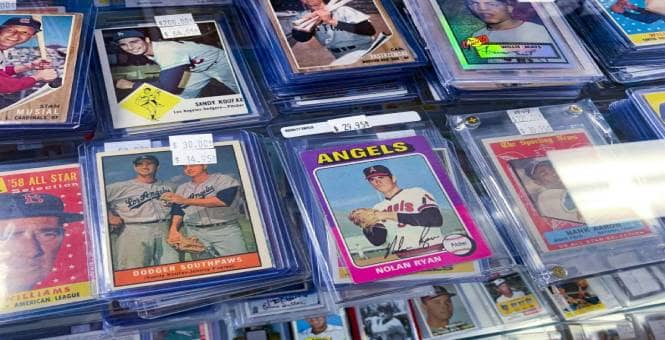

It is unlawful for any person, or agent to knowingly manufacture, produce or distribute illegitimate, counterfeit, unlicensed sports trading cards with the intent to deceive, injure or defraud another
What is the definition of Legitimate Sport Trading Cards under Business and Professions Code 21672(a) BPC?
Legitimate Sports trading cards, as defined under Business and Professions Code 21672(a) BPC, are sports trading cards, produced as any cards, used for trade, purchase, tokenization, sale or leverage in commerce; which has the company name; team logo; an image or representation or facsimile of a team’s players, its members or association in accordance to a licensing agreement with an appropriate licensing authority.
What is the definition of Counterfeit Sports Trading Cards under Business and Professions Code 21672(a) BPC?
Counterfeit Sports Trading Cards, as defined under Business and Professions Code 21672(a) BPC, are sports trading cards produced for trade, purchase, tokenization, sale or leverage in commerce; without the consent of an appropriate licensing authority; for which there is a forgery, a copy, degradation or limitation of the original trading card’s trademark, patent or copyright with the intent to pass the card and its mark as authentic.
What is the definition of Unlicensed Sports Trading Cards under Business and Professions Code 21672(a) BPC?
Unlicensed Sports Trading Cards, as defined under Business and Professions Code 21672(a) BPC, are cards produced in commerce without the authorization of a licensed authority, excluding those found in publications or bound in publications.
What is the definition of an appropriate licensing authority under Business and Professions Code 21672(a) BPC?
An appropriate licensing authority, as is one that is established by an expressed, written permission to manufacture, produce, distribute and sell Legitimate Sports Trading Cards, as permitted by the valid owner(s) of the licensing rights granted by the USPTO toward the image, work, term, name, symbol, logo or insignia that might appear on the sports trading card.
What is the mental state required for a violation under Business and Professions Code 21672(a) BPC?
The mental state required for a violation under Business and Professions Code 21672(a) BPC, is knowingly. Knowingly, requires a person to be consciously aware of their conduct and act, and desire its completion, while being reasonably aware of the natural and probable consequences that might result from the act’s completion. As applied to Business and Professions Code 21672(a) BPC, the State is required to prove, beyond a reasonable doubt that the accused was consciously aware that they do not have the permission of an appropriate licensing authority to transact in the business of sports trading cards; and consciously aware that to do so is a violation of an established agreement which was created to protect the identify and likeness of the logos, marks, brand, and other identifiers of the entities with significant properties over the trading cards; and as such manufacture, produce or distribute illegitimate, counterfeit, unlicensed sports trading cards with the intent to deceive, injure or defraud another; and are consciously aware of the results that would transpire as a result.
A violation of Business and Professions Code 21672(a) BPC is charged as a misdemeanor. The penalty for a violation includes confinement not exceeding 6 months in jail, and fines not exceeding $1,000 dollars. In addition to criminal penalties, the strict liability assessments pertaining to Unlicensed Sports, Counterfeit, or Illegitimate Sports Trading Cards are a refund to the buyer for the full amount paid, or true value of the consideration paid for each card; and a civil assessment not exceeding $5,000 dollars for each card purchased.
What is an example of a violation of Business and Professions Code 21672(a) BPC?
Kendall was an artist that just got into NFT Art. He is the sole owner of Lebron James’s Basketball Rookie Card with the Cleveland Cavaliers. Kendall created a NFT from the trading sports card. He substituted the NBA designation, with the term “ID.Supra Lakers” in its place and substituted the Laker team name logo in place of the Cavalier team name. He created a series of 30 NFTs that varied the colors and gait of the term: ID Supra Lakers“. He promoted the NFTs on his Web 3 personal auction page; and sent notice on the blockchain about his intent to sell the items for $5,000 each. In 12 minutes, an offer was made for the purchase of all 30 NFTs. Kendall made $150,000 dollars. Word traveled quickly. So quickly that legal representatives of the NBA contacted the investment group and sent them a cease-and-desist letter requesting that the items be destroyed, or they will seek criminal and civil charges including any damages regarding their perception of their infringement rights. The investment group got scared and sought reimbursement, when Kendall refused, the group contacted the police. After an investigation of the transactions on the blockchain, Web Kendall was arrested. The Court, in lieu of jail time ordered a complete restitution to the buyer, but Kendall had to pay a civil assessment of $ 500 dollars per item for a total of $45,000.
If you are charged with a violation of Business and Professions Code 21672(a) BPC, call Law Mart today.
Call LAW MART for a FREE Case Review: 310-894-6440

Copyright © 2024 law – Powered by AmelCS